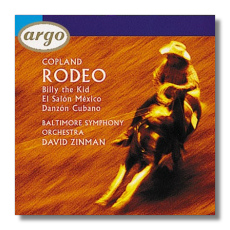
The Internet's Premier Classical Music Source
Related Links
- Copland Reviews
- Latest Reviews
- More Reviews
-
By Composer
-
Collections
DVD & Blu-ray
Books
Concert Reviews
Articles/Interviews
Software
Audio
Search Amazon
Recommended Links
Site News
 CD Review
CD Review
Aaron Copland

Ballet Music
- Rodeo
- Billy the Kid
- El Salón México
- Danzon Cubano
Baltimore Symphony Orchestra/David Zinman
Argo 440639 78min
As his recordings have consistently demonstrated over the years, David Zinman is a splendid interpreter of American music. The broad sweep of his phrasing, his tireless attention to detail and nuance, vivid colors, unhurried tempos, and bouncy rhythms all combine to make this new recording quite compelling. Indeed, Zinman here reminds me very strongly of his beloved teacher, Pierre Monteux. It's a shame that the Frenchman never got around to recording any Copland. He probably would have produced a recording very similar to this one.
Unlike most conductors, Zinman presents both of Copland's colorful western ballets in their complete, original editions, and it is heartwarming to hear them in such thoroughly committed and refreshing performances. There's considerably less "padding" here than in other notable 20th Century ballets (Stravinsky's Firebird and Ravel's Daphnis come immediately to mind), and the brief transitions between the familiar numbers are all quite interesting - or so it seems thanks to Zinman's attentive and sympathetic treatment. Billy the Kid, in particular, flows much more seemlessly in its complete edition, and the score boasts a considerable amount (12 or 13 minutes) of sublime music that is not heard in the standard suite. In Rodeo, a raucous 'Ranch house party' and deliciously coquettish addition just before the end the 'Hoe-down' are equally welcome.
The Baltimore Symphony plays at least as well as the St. Louis Symphony did in their EMI recording of these two ballets, but Zinman's interpretations are considerably more exciting, colorful, and coherent than Slatkin's. For example, the gun battle that results in Billy's capture is more fateful and palpably tragic than any other version I have encountered. But Zinman is most sensitive to the reflective moments in these works, and his relaxed tempos help create a remarkable atmosphere of repose and solace. While Zinman can't quite approach the irrepressible verve of Bernstein's Rodeo Suite - and to be completely fair, no on else ever has - his delightfully sprung rhythms make this familiar music sound utterly fresh and new. The solo winds play with great character and dash - particularly the broadly comic trombone and trumpet in the 'Buckaroo holiday'. Clearly, everyone involved in these sessions had a great deal of fun.
Zinman's jovial and jazzy Danzon has at last enabled me fall in love with this piece. El Salon becomes a joyous and quite sexy romp in Zinman's hands, and the clarinet solo at 8:40 is by far the most arresting since Rosario Mazzeo's unforgettable effort in Koussevitzky's classic 1938 Boston Symphony recording (Pearl). The realism and presence of the bass drum is nothing short of astounding. Be sure to warn the neighbors to evacuate the area before you play this track.
Argo's generous timing - not to mention their transparent, rich, and vivid sonics - makes this disc outstanding all around.
Copyright © 1996, Tom Godell


















